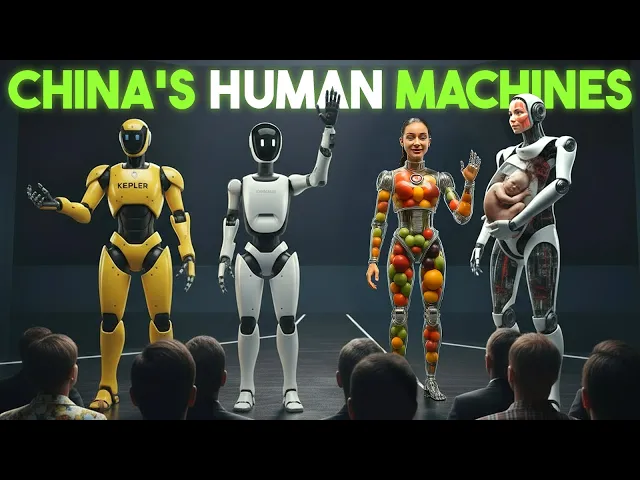New China AI Robots SHOCK The World: Acting Human, Artificial Astronauts, Robotic Birth and More

China's AI revolution is transforming humanity
In a world racing toward an AI-dominated future, China has quietly positioned itself at the vanguard of robotic innovation. While Western media headlines often focus on OpenAI's latest GPT model or Google's AI experiments, something extraordinary is happening across the Pacific that deserves our immediate attention. The breathtaking pace of China's AI and robotics advancements isn't just impressive—it's potentially reshaping the fundamental relationship between humans and machines.
Key Points
- China has developed remarkably human-like robots with advanced capabilities in emotional expression, movement, and autonomy that go beyond what most Western companies have publicly demonstrated
- The integration of AI into Chinese society is accelerating rapidly across multiple sectors including space exploration, manufacturing, healthcare, and everyday consumer interactions
- China's strategic investment in AI infrastructure and talent pipeline may be creating a sustainable competitive advantage that will be difficult for other nations to overcome in the near term
The Chinese AI ecosystem is more advanced than most realize
The most striking revelation from observing China's AI development is how significantly Western business leaders may be underestimating the sophistication of what's happening. These aren't merely iterative improvements on existing technology—they represent fundamental leaps in what's possible. Take the humanoid robots recently unveiled by companies like Fourier Intelligence. These machines don't just mimic human movement; they display eerily natural facial expressions, maintain eye contact during conversations, and execute complex physical tasks with astonishing dexterity.
What makes this particularly significant is how these advancements connect to broader industry trends. While companies like Boston Dynamics have garnered attention for robotics that can run and jump, China's focus appears more holistic—creating machines that can meaningfully integrate into human social contexts. This approach aligns with research suggesting that consumer and business adoption of robotics accelerates dramatically when machines cross certain thresholds of social acceptability.
The competitive implications are substantial. As Western businesses explore modest AI implementations like chatbots and recommendation engines, Chinese competitors may be developing fundamentally different capabilities. Companies like Xiaomi have demonstrated robots capable of understanding emotional context and responding appropriately—crossing into territory previously considered science fiction. For business leaders, this represents both an opportunity and a warning: the AI revolution may be further advanced than your quarterly strategy sessions acknowledge.
Beyond the headlines: China's comprehensive
Recent Videos
How To Earn MONEY With Images (No Bullsh*t)
Smart earnings from your image collection In today's digital economy, passive income streams have become increasingly accessible to creators with various skill sets. A recent YouTube video cuts through the hype to explore legitimate ways photographers, designers, and even casual smartphone users can monetize their image collections. The strategies outlined don't rely on unrealistic promises or complicated schemes—instead, they focus on established marketplaces with proven revenue potential for image creators. Key Points Stock photography platforms like Shutterstock, Adobe Stock, and Getty Images remain viable income sources when you understand their specific requirements and optimize your submissions accordingly. Specialized marketplaces focusing...
Oct 3, 2025New SHAPE SHIFTING AI Robot Is Freaking People Out
Liquid robots will change everything In the quiet labs of Carnegie Mellon University, scientists have created something that feels plucked from science fiction—a magnetic slime robot that can transform between liquid and solid states, slipping through tight spaces before reassembling on the other side. This technology, showcased in a recent YouTube video, represents a significant leap beyond traditional robotics into a realm where machines mimic not just animal movements, but their fundamental physical properties. While the internet might be buzzing with dystopian concerns about "shape-shifting terminators," the reality offers far more promising applications that could revolutionize medicine, rescue operations, and...
Oct 3, 2025How To Do Homeless AI Tiktok Trend (Tiktok Homeless AI Tutorial)
AI homeless trend raises ethical concerns In an era where social media trends evolve faster than we can comprehend them, TikTok's "homeless AI" trend has sparked both creative engagement and serious ethical questions. The trend, which involves using AI to transform ordinary photos into images depicting homelessness, has rapidly gained traction across the platform, with creators eagerly jumping on board to showcase their digital transformations. While the technical process is relatively straightforward, the implications of digitally "becoming homeless" for entertainment deserve careful consideration. The video tutorial provides a step-by-step guide on creating these AI-generated images, explaining how users can transform...
